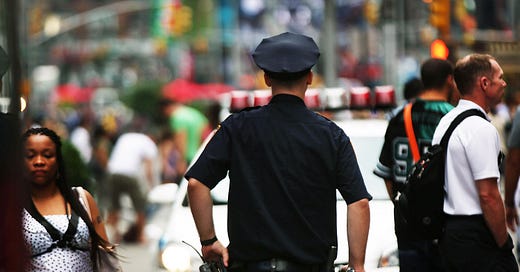Judge: Qualified Immunity Is an Unqualified Disaster
The police-protecting doctrine is legally baseless, costly, and liberty-eroding.
DISTRICT COURT JUDGES occupy the bottom rung of the federal judicial hierarchy. They hold hearings, decide motions, and preside over trials. They do not make precedent; they apply it. It is therefore highly unusual for district court judges to publicly criticize appellate-court decisions they are bound to apply, much less rulings of the Supreme Court. But that’s precisely what happened last week when Mississippi Judge Carlton Reeves called for the eradication of qualified immunity.
In a nutshell, qualified immunity is a legal defense that police and other government officials can assert in civil rights cases to defeat otherwise meritorious claims by arguing that it was not yet “clearly established” that the particular thing they did—whether shooting a fleeing suspect in the back or stealing $225,000 worth of cash and rare coins while executing a search warrant—was unconstitutional.
As Judge Reeves explains in his May 20 opinion denying qualified immunity to a Jackson, Mississippi detective who helped frame an innocent man for murder, there are so many problems with that doctrine that it’s hard to know where to start.
First and most fundamentally, the judiciary’s job is to apply law, not make it. And yet, in a blatant act of judicial policymaking, the U.S. Supreme Court read into the nation’s premier civil rights law, 42 U.S.C. §1983, the defense of qualified immunity despite the fact that the statute itself makes no mention of any immunities whatsoever. Judge Reeves notes how absurd it is to suppose that the 1871 law, which was designed to protect newly freed African Americans in particular from the predations of badge-wearing Klansmen and other tyrannical government officials, would have included a defense so broad as to entirely defeat the law’s unambiguous purpose. It makes no sense.
Second, Judge Reeves notes the practical consequences of qualified immunity, which include a free pass for a cop who shot an innocent boy in the leg from eighteen inches away while blazing away at a non-threatening family dog; letting a jailer off the hook who stood and watched without calling 911 as a suicidal prisoner hanged himself with a telephone cord inside his own cell; and finding no “clearly established” right not to be locked up “in a frigid cell, covered in other persons’ feces and forced to sleep naked in sewage” for six days because the only case on point held that “prisoners couldn’t be housed in cells teeming with human waste for months on end.” (The latter case was so obviously wrong that the Supreme Court summarily reversed without briefing or argument.) Another practical consequence according to Judge Reeves is the perpetuation of racial inequality. He notes that black Americans are more frequently subjected to stops, searches, arrests, and lethal force than other Americans, and “qualified immunity then bars many of these individuals from securing justice” when their rights are violated.
In what may be the most powerful part of his opinion, Judge Reeves reviews the policy justifications for qualified immunity and shows how each of them is completely baseless. Thus, qualified immunity does not promote fairness by putting police on notice of what they may and may not do for the simple reason that they neither read nor receive training on relevant court decisions beyond some rudimentary instruction at the police academy. Nor do police face financial ruin from damage awards—almost without exception, they are indemnified by their employers, which means the costs are passed along to taxpayers. And research by Joanna C. Schwartz, a professor at the UCLA School of Law, indicates that far from streamlining litigation and eliminating unmeritorious cases, qualified immunity “may, in fact, increase the costs and delays associated with constitutional litigation.” The list of baseless assumptions and judicial wishcasting goes on and on.
Judge Reeves’s final critique is perhaps the most morally devastating. Emphasizing the difference between civil and criminal cases, he explains how the Supreme Court manages to get the relevant calculus exactly backwards, creating a world in which it is very easy for the government to convict and imprison people for crimes they had no idea existed and conduct they never imagined might be illegal, but very difficult to subject a police officer or other government official to mere civil liability for conduct that everyone agrees was unconstitutional but in a serendipitously novel way. As he laments at the end of this trenchant discussion, “It cannot be true that in America, it is easier to take away one’s liberty than hold the government accountable for violating the very Constitution guaranteeing liberty.” But it absolutely is true, and we have the Supreme Court to thank for it.
Will Judge Reeves’s cri de coeur make any difference? Not by itself, perhaps. But it adds to a steadily growing drumbeat of dissent and disdain for a judicially confected, morally bankrupt, power-aggrandizing legal doctrine that the Supreme Court had no business inventing in the first place, and which it persistently refuses to defend on the merits or revisit despite seeing each of its shabby rationalizations torn to pieces by lawyers, academics, activists, and even fellow jurists like Carlton Reeves. An ostrich can only bury its head in the sand so deep and for so long. Or nine ostriches, as the case might be.






